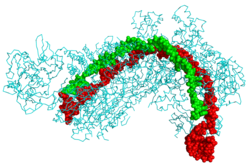Have you heard of CRISPR? Although CRISPR has been used in the world of genetic research for some years, it has recently emerged into the cultural mainstream. Researchers now realize that, if they wish, they can manipulate or delete any gene in a given genome to essentially "manufacture" a person to order. In other words, "designer babies."
CRISPR was the topic of my atheist discussion group this month. One of us is a molecular biologist and very well informed about the current state of research. Running through his presentation and our discussion was the question of ethics: how do we decide to draw the line? If we can, say, eliminate the gene that causes sickle cell anemia, should we? Do we know enough to be able to assess the broader consequences of such an action? And what is the line between that and a parent's desire to ensure that his/her child will be born with a particular set of genes, genes that, to the parent's mind, help the child achieve "success" (whatever this is) in life

Where do we stop? And what is our basis for doing so? As we talked, I sensed that although everyone who was sharing would oppose allowing the creation of "designer babies," other than asserting the special nature of the human being (this from a human being), no one could offer a solid ethical basis for such opposition. On the other hand, some people suggested that, well, humanity's ability to alter its genetic pool is just another step in the evolution of the human species. It is an organic happenstance that reflects the continuing creative capacity of humankind. We may not like it, but we should understand that this is the inevitable fruit of being human.
It seems to me that what is missing from the debate is a solid starting point for assessing what CRISPR means. If we attribute CRISPR to the wonder of human evolution, we treat it as an amoral development in the life of a given species: it has no real point. It happened. If we insist that humanity is special, on what basis do we do so? We're humans trying to justify our humanness to a random world without a larger point.
Absent inviting transcendence and its liberating vantage point into our deliberations, we are simply looking at ourselves to figure out ourselves. It's a journey that, if materialistic evolution is true, has no meaningful starting point and no meaningful end.
It just is.
Is this enough?
No comments:
Post a Comment